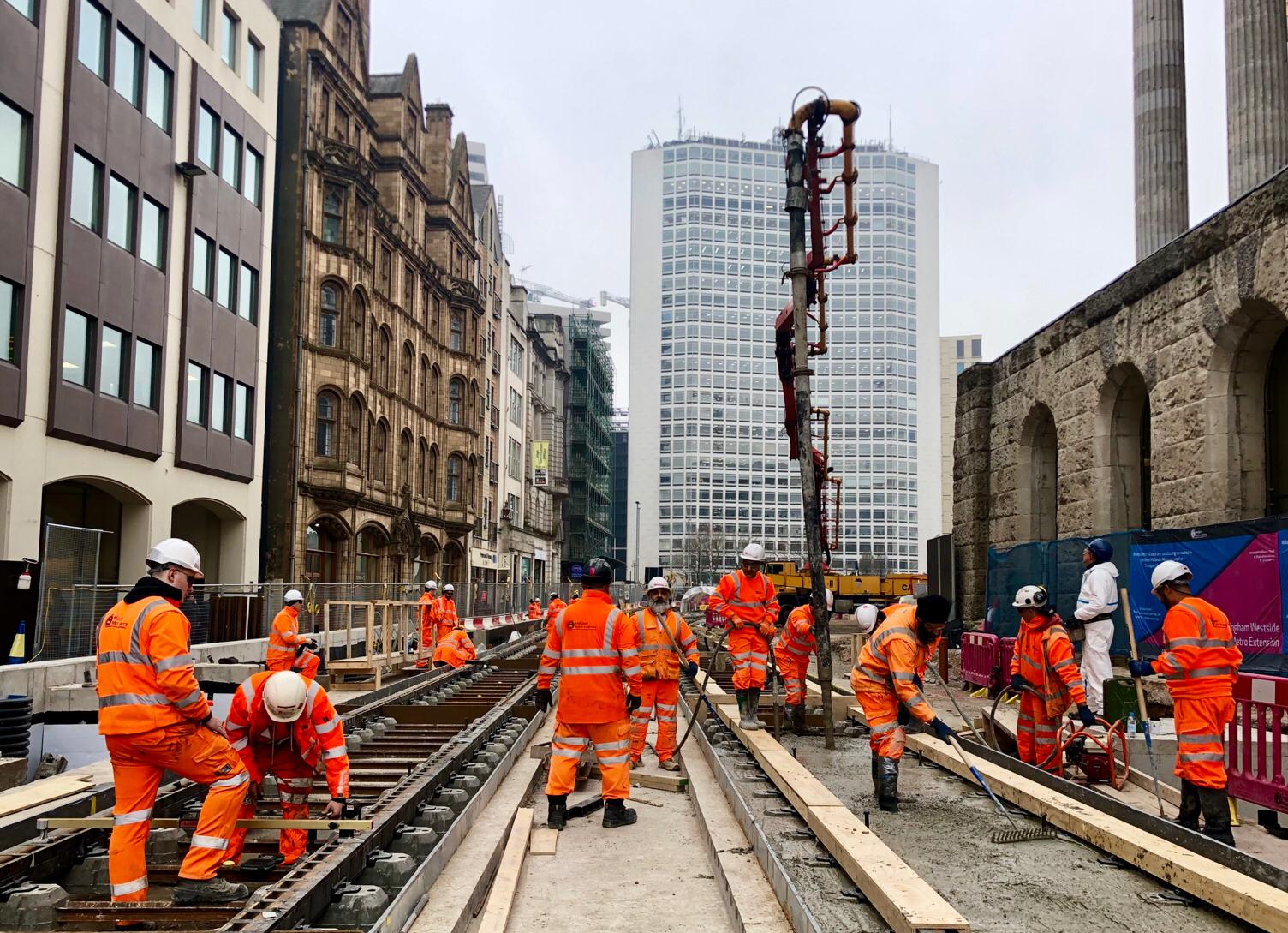Birmingham’s Centenary Square Extension receives Construction Award
Overview
The new tram service connects a fast-growing area of Birmingham with the city centre and beyond. Fast, reliable public transport is now delivering opportunities for economic growth, social regneration, improved air quality and more. This project received a BREEAM Infrastructure rating of Very Good.
About
The West Midland Combined Authority was set up to improve the region’s economy. It invests in the region through collaboration with partners like the MMA.
Background
The MMA, working on behalf of Transport for West Midlands (TfWM), which is part of the West Midlands Combined Authority (WMCA), has planned, designed and built a series of light rail extensions connecting Birmingham to the wider region.
The Metro route
The Centenary Square phase of the Metro extension, together with the Edgbaston section, is part of the Birmingham Westside Metro extension. This extended West Midlands Metro service along Pinfold Street to a stop on Paradise Street at the Victoria Square serves the Town Hall and the main civic centre buildings. The route then passes along Paradise Street and Paradise Circus into Broad Street where it stops in Centenary Square.
The MMA began construction on the first phase of the Birmingham Westside Metro extension in June 2017. The initial stage of the project added two new tram stops – Town Hall and Library – and opened ahead of schedule and on-budget in December 2019. The second phase (the Edgbaston element), which added an additional three tram stops, opened to passengers in July 2022.
The service
A regular peak time service now operates on the route and delivers passengers to key locations throughout the city. These include the Library of Birmingham, Symphony Hall, the International Convention Centre (ICC), Birmingham Rep, the Council House and Town Hall and offices in and around Centenary Square and Victoria Square. It also serves the Arena Central and Paradise developments, which have changed the skyline of city.

Challenges
The area to the west of the city centre is an important commercial hotspot, and is the site of a number of new developments. However, access to this area was restricted due to the lack of high-quality public transport links. The new Metro line improves the sustainable transport options in the city centre. This has delivered significant opportunities for economic growth and social regeneration and also brings a host of environmental benefits to Birmingham such as improved air quality and reduced noise.
A historical city centre
The project is located in a busy and historical city centre, which limited the use of certain sustainability strategies.
For example, the lack of space for storage of material presented a constraint for the reuse of site materials.
The materials choices were also bound by strict aesthetic requirements, as they needed to match the aesthetics of the surrounding historic environment. For example, granite paving had to be imported from abroad, which meant increased carbon emissions from the extraction and transportation of the material.
Solutions
Standardised track design
At the design stage, the team identified a range of measures to reduce carbon emissions associated with standardised design elements. For these elements the carbon emissions were quantified and then verified at construction stage. The result was a 29% saving for the sections of the extension which use the standard track design (71% of route’s length).
Resource efficiency
70% of UK-based supplies were sourced from within the West midlands area. In additional, over 57,000 tonnes of waste was diverted from landfill - 96 % of the total waste.
Benefits
A public commitment to sustainability
The client identified BREEAM Infrastructure as the best way to embed a sustainability strategy for the project into the new Alliance methods of working.
The award was a public statement of the sustainability credentials of the project. The BREEAM Infrastructure certification became one of the client’s key metrics for the project and has allowed the team to track best practices applied to the project. It has also enjoyed reputation benefits, thanks to effectiveness of the sustainability and environmental procedures and best practices implemented in the project.
Efficiency savings
The BREEAM Infrastructure requirements were embedded in the decision process from the early stages of the project. Through a series of workshops, the team were able to implement principles of reduced material wastage, energy and water savings and optimised material orders.
People and communities
The project scored 96% in this section due to the extensive consultation carried out for the project early on at the design and permitting stages, and the stakeholder engagement throughout the project.
Various measures were put in place to mitigate nuisance to the community. These included regular meetings and information bulletins to keep the community informed of any events that would disrupt normal activities in the area.
Throughout the construction stage, a reporting system kept track of the public’s requests and communications. These were fed back to the construction team for any remedial actions as required.
